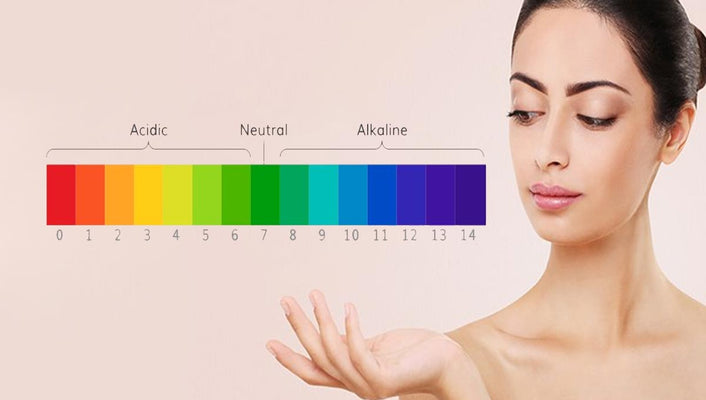Our skin is the largest and most delicate organ in the body, which requires constant care. Your skin’s overall health is dependent on maintaining the right balance between the acidic and alkaline levels, which is determined by evaluating your skin’s pH levels.
Did you know, your skin’s pH level determines your skin’s current health.
What Is ph?
pH stands for “potential of hydrogen”, your skin’s pH levels are measured to evaluate the acid-alkaline ratio in your skin. With 0 being the most acidic, and 14 being the most alkaline.
Our skin is made up of oil (sebaceous) and sweat glands (sudoriferous glands), which maintain our skin’s health and elasticity. The acidic layer in our skin is known as the “acid mantle”, this fights any bacteria trying to invade our skin.
Acid mantle consists of sebum (free fatty acids), which are released from the sebaceous glands, which then mixes with lactic and amino acids from our sweat, to create the skin's pH.
A healthy pH level would generally fall under 4.2 - 6.2, which ideally should be acidic than alkaline.
What Affects Your Skin’s pH?
Multiple factors cause damage to your skin’s pH levels on a daily basis and make the skin more vulnerable to damage such as:
1. Aging
Our skin over the years loses its collagen (elasticity), which also drops our skin’s pH levels.

Taking care of your skin by using the right products and following a daily regimen helps maintain your skin’s health over the years.
2. Climatic Changes
Seasonal and climatic changes are unpredictable and equally, take a toll on the skin’s health.

Therefore, it is very crucial to change your skin care products simultaneously with changes in climate, to avoid further damage.
3. Using Wrong Products
Utilizing or experimenting with unknown products which don’t suit your skin type, can cause abrupt allergic reactions and make your skin more sensitive.

Considering before using any skin care product while being unaware whether it would suit your skin type can eliminate the possibilities of stripping your skin of its natural oils, causing any allergic reactions and sensitizing your skin even further.
4. Hormonal Changes
Hormonal changes are bound to occur in everyone's life and they are most active as we age, during menopause and pregnancy.

All of which cause changes in our body and affect our skin’s pH levels, due to an increase in our hormone levels.
5. Products With High Alkaline Levels
Soaps and harsh cleansers which have higher alkaline levels that range from 9-14 can disturb your skin's natural pH levels.

Resulting in dryness, abrupt allergic reactions, cause further damage and also aggravate existing skin concerns.
Setbacks Of Unbalanced pH levels
An unbalanced skin pH level tends to weaken and break your skin's natural barrier down if your skin's unbalanced pH levels aren't addressed on time immediately.
Here are a few setbacks of not addressing an unbalanced pH level on time:
- Your skin is easily vulnerable to infections caused by bacteria, fungi, and other aggressors.
- Skin breaks and is damaged easily due to the skin being unable to retain any moisture in the skin.
- Easily prone to acne breakouts, rashes, and other skin sensitivities due to continuous barrier damage.
A balanced pH indicates your skin’s overall health, so, therefore, maintaining a healthy pH level makes your skin strong and impenetrable to any infections and damage.
Recommended Products
Was this Article helpful?
- Least helpful
- Most helpful










